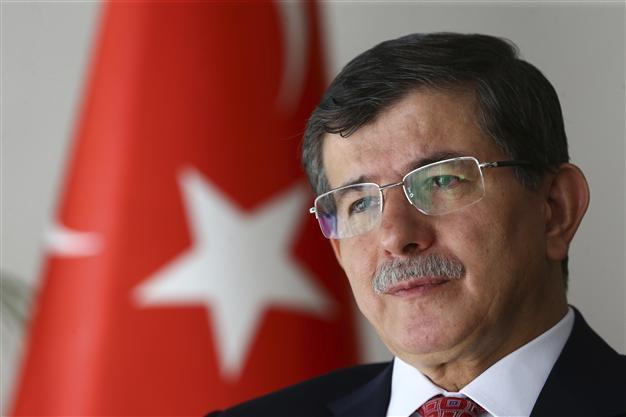Turkey says in talks with Israel, Egypt for Gaza aid
ANKARA - Reuters

Turkey's Foreign Minister Ahmet Davutoğlu is seen during an interview with Reuters in Ankara August 6. REUTERS Photo
Turkey is seeking Israeli and Egyptian agreement for an air corridor to provide humanitarian aid to Gaza and evacuate possibly thousands of injured Palestinians for treatment, Foreign Minister Ahmet Davutoğlu said on Aug. 6.In an interview with Reuters, Davutoğlu also said Turkey was stepping up aid to an estimated 1.5 million people displaced in northern Iraq's Kurdish region after a rapid advance by Islamic State militants brought the violence closer to its borders.
Turkey, eager to re-establish itself as a powerhouse in a rapidly changing Middle East, is already sheltering more than a million refugees from the war in Syria and is playing a major role in the development of Iraqi Kurdistan.
Despite crumbling relations with Israel, it also hopes through its ties with the Palestinian authorities to play a part in brokering a long-term settlement in the Gaza Strip.
A humanitarian truce in Gaza, where half a million people have been displaced by a month of bloodshed, held for a second day on Wednesday but could be sustained only if basic needs such as power, water and healthcare were provided, Davutoğlu said.
"Yesterday I spoke with (Palestinian) President Mahmoud Abbas and we want to get the injured people, thousands of them. They need urgent medical therapy, and we have already allocated places in our hospitals for them," he said.
We are talking with both Egypt and Israel to have an air bridge to send humanitarian assistance ... If permission is given, our air ambulances will be carrying these passengers," Davutoğlu said, adding there was "no limit" to the numbers of injured Palestinians Turkey was ready to treat.
Israel withdrew ground forces from the Gaza Strip on Aug. 5 morning and started a 72-hour Egyptian-brokered ceasefire with Hamas, which rules the coastal enclave.
Efforts to turn the ceasefire into a lasting truce could prove difficult, with the sides far apart on their central demands, and each rejecting the other's legitimacy. Hamas rejects Israel's existence and vows to destroy it, while Israel denounces Hamas as a terrorist group and eschews any ties.
"We hope that the talks in Cairo will be successful to achieve a sustainable ceasefire and we hope that the rights of Palestinian people will be respected in the coming days, months and years ... The only way to achieve this is to have a Palestinian state," Davutoğlu said.
"(Peace) is achievable if the international community acts in an objective manner ... But if they give a signal that international law, rules and values should be respected by all but Israel is an exception ... then it is not achievable."
Pro-Palestinian sentiment runs high in mostly Sunni Muslim Turkey, and protesters have repeatedly taken to the streets in recent weeks to demonstrate against Israel's offensive in Gaza.
Prime Minister Recep Tayyip Erdoğan, campaigning for a presidential election on Aug. 3, has likened Israel's actions to those of Hitler and warned it would "drown in the blood it sheds".
Aid to northern Iraq
Davutoğlu, seen as a possible successor to Erdoğan as prime minister after Sunday's election, said Turkey was concerned by the advances made by Islamic State fighters, who have seized large areas of Iraq and Syria and were also part of a Sunni militant incursion into Lebanon.
He said the sectarian policies of Syrian President Bashar al-Assad and Iraqi Prime Minister Nuri al-Maliki were partly responsible for sowing the seeds of radicalisation.
"The basic root of this development is sectarian policies adopted by previous Iraqi and Syrian administrations, today as well," Davutoğlu said. "Sunni leaders have been excluded from the (Iraqi) political process in the last two or three years and there has been a radicalisation ... in certain Sunni-populated regions which were not happy because of the sectarian policies of Maliki. Similar things happened in Syria."
Iraq's Kurdistan region has acted as a buffer for Turkey against violence further south, but Kurdish forces attacked Islamic State fighters near the regional capital of Arbil on Aug. 6 in response to a rapid advance by the militants.
Davutoğlu said Turkey had stepped up humanitarian assistance to an estimated 1.5 million internally displaced persons (IDPs) in Iraq's Kurdish north, describing the stability of the region as "very important" for Turkey.
"We have sent thousands of tents as well as more than 200 trucks already sent to the region... and there will be additional humanitarian assistance because in the Kurdish region, (Iraqi Kurdistan President) Barzani told me they now have 1.5 million IDPs," he said.
"So this turmoil is really a threat to regional stability, not only to Turkey," Davutoğlu said, adding Turkey would take all necessary measures to maintain stability around its borders.
















